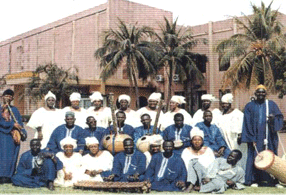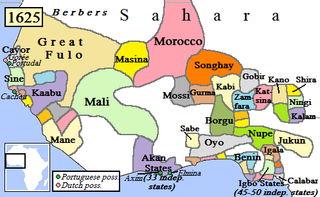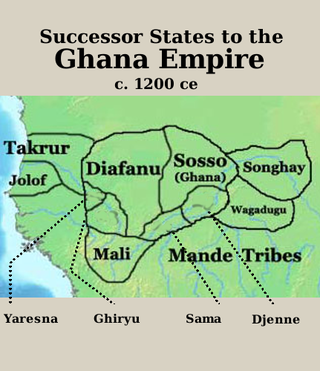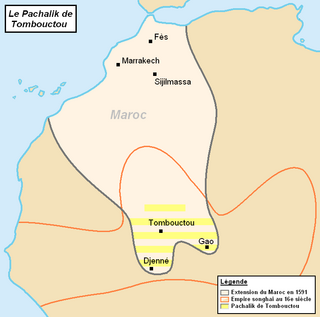Related Research Articles

The Mali Empire was an empire in West Africa from c. 1226 to 1670. The empire was founded by Sundiata Keita and became renowned for the wealth of its rulers, especially Mansa Musa. At its peak, Mali was the largest empire in West Africa, widely influencing the culture of the region through the spread of its language, laws, and customs.

The music of Mali is, like that of most African nations, ethnically diverse, but one influence predominates: that of the ancient Mali Empire of the Mandinka. Mande people make up around 50% of Mali's population; other ethnic groups include the Fula (17%), Gur-speakers 12%, Songhai people (6%), Tuareg and Moors (10%).
Sundiata Keita was a prince and founder of the Mali Empire. He was also the great-uncle of the Malian ruler Mansa Musa, who is usually regarded as the wealthiest person of all time, although there are no reliable ways to accurately calculate his wealth.

The Mandinka language, or Mandingo, is a Mande language spoken by the Mandinka people of Guinea, northern Guinea-Bissau, the Casamance region of Senegal, and in The Gambia where it is one of the principal languages.

The Bamana Empire was one of the largest states of West Africa in the 18th century. Along with Kaarta it was one of the most important successors of the Songhai Empire. Based on an earlier kingdom established in 1640, it grew into a powerful empire in the early 18th century under Bitòn Coulibaly. The empire existed as a centralized state from 1712 until the 1861 invasion by the Toucouleur conqueror El Hadj Umar Tall.
Naré Maghann Konaté was a 12th-century faama (king) of the Mandinka people, in what is today Mali. He was the father of Sundiata Keita, founder of the Mali Empire, and a character in the oral tradition of the Epic of Sundiata.

Wassoulou is a cultural area and historical region in the Wassoulou River Valley of West Africa. It is home to about 160,000 people, and is also the native land of the Wassoulou genre of music.

Mansa is a Maninka and Mandinka word for a hereditary ruler, commonly translated as "king". It is particularly known as the title of the rulers of the Mali Empire, such as Mansa Musa, and in this context is sometimes translated as "emperor". It is also a title held by traditional village rulers, and in this context is translated as "chief".

Tieba Traoré was the fourth king of the Kénédougou Empire, reigning from 1877 until his death in 1893.
Babemba was the fifth and final Faama of the Kénédougou Kingdom, ruling from the 1893 death of his brother Tieba Traoré until the capture of Sikasso by the French in 1898. He is today remembered as a hero of anti-colonial resistance in Mali.

The Wassoulou empire, also referred to as the Mandinka Empire, Samory's Empire or the Samorian State, was a short-lived West African state that existed from roughly 1878 until 1898, although dates vary from source to source. It spanned from what is now southwestern Mali and upper Guinea, with its capital in Bissandugu; it expanded further south and east into northern Ghana and Ivory Coast before its downfall.

The Kénédougou Kingdom,, was a pre-colonial West African state established in the southeastern portion of present-day Mali, as well as parts of northern Cote d'Ivoire and western Burkina Faso.
The Keita dynasty ruled pre-imperial and imperial Mali from the 11th century into the early 17th century. It was a Muslim dynasty, and its rulers claimed descent from Bilal Keita, despite Bilal having been of Abyssinian origin.

Kaabu (1537–1867), also written Gabu, Ngabou, and N'Gabu, was a federation of Mandinka kingdoms in the Senegambia region centered within modern northeastern Guinea-Bissau, large parts of today's Gambia, and extending into Koussanar, Koumpentoum, and the Casamance in Senegal.
Sofa is a Mandinka term for slave soldiers who served in the army of the Mali Empire. Sofas would also fight, in varying capacities, in the armies of later Mandé states such as the Bamana and Wassoulou empires.

Pre-imperial Mali refers to the period of history before the establishment of the Mali Empire, an African empire located mostly in present-day Mali, in c. 1235.

The Kangaba Cercle is an administrative subdivision of the Koulikoro Region of Mali. Its seat is the town and commune of Benkadi Habaladougou (Kenieba), also known as Kangaba. It lies at the southwest corner of the region, along the Guinean border, with the Niger River forming its southern edge.
The military history of the Mali Empire is that of the armed forces of the Mali Empire, which dominated Western Africa from the mid 13th to the late 15th century. The military culture of the empire's driving force, Mandinka people, influenced many later states in West Africa including break-away powers such as the Songhay and Jolof empires. Institutions from the Mali Empire also survived in the 19th century army of Samory Ture who saw himself as the heir to Old Mali's legacy.

The Battle of Jenné was a military engagement between forces of the Mali Empire and the Moroccan Pashalik of Timbuktu. The battle marked the effective end of the great Mali Empire and set the stage for a plethora of smaller West African states to emerge.

Manding, Manden or even Mandé is a region located in West Africa, a space between southern Mali and eastern Guinea. It is the historic home of the Mandinka community.
References
- ↑ Niane, Djibril Tamsir (1994). Sundiata : an epic of old Mali . Harlow: Pearson Longman. ISBN 9780582264755.
- ↑ School, Live Lingua-Online Language. "Live Lingua Mandinka". www.livelingua.com.
- ↑ Chappatte, André (2022-11-01). In Search of Tunga: Prosperity, Almighty God, and Lives in Motion in a Malian Provincial Town. University of Michigan Press. ISBN 978-0-472-22074-8.